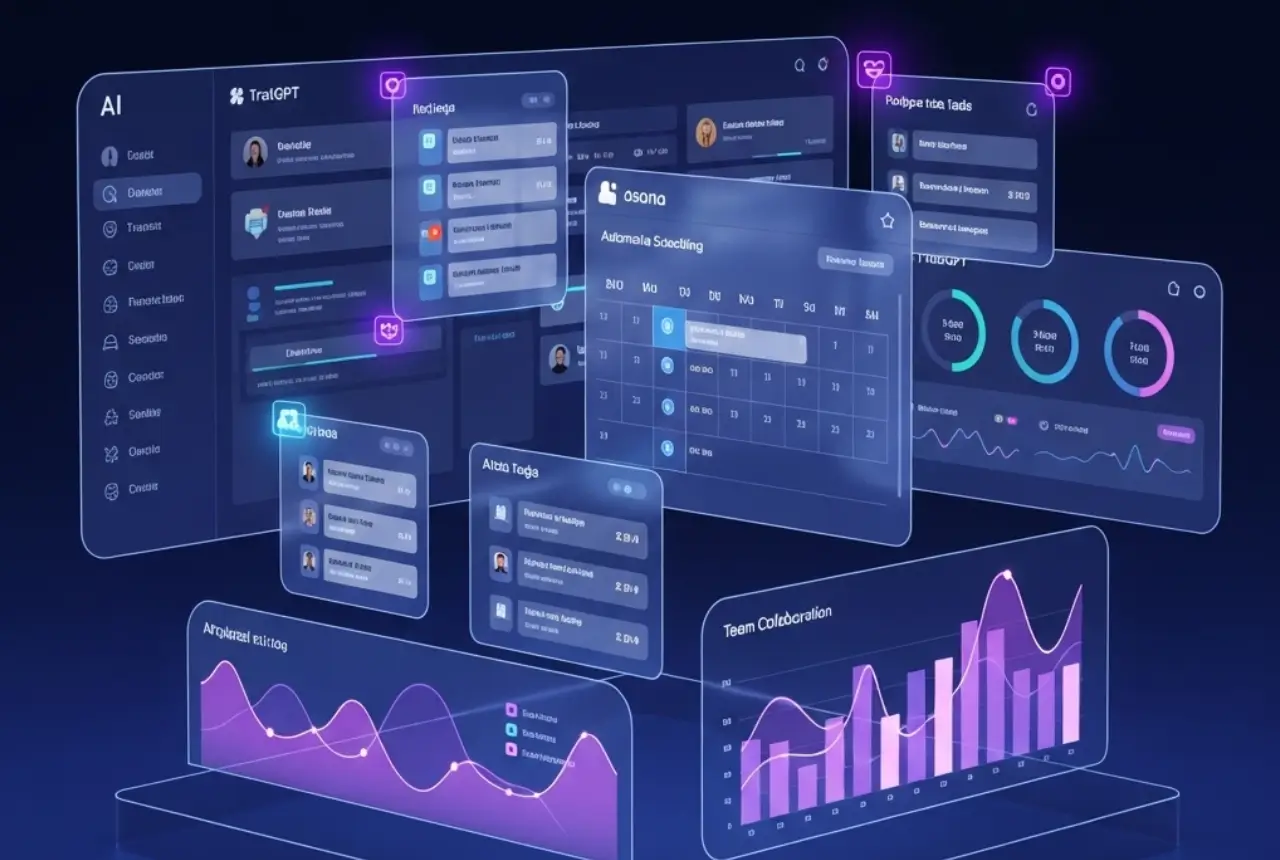How to Use AI for Project Management: The Complete 2025 Guide

Artificial Intelligence is fundamentally transforming how teams plan, execute, and deliver projects.
In 2025, project managers are no longer relying solely on spreadsheets and sticky notes. Artificial Intelligence (AI) has emerged as a transformative force in project management, helping teams become more efficient, data-driven, and strategic.
Whether you're managing a remote software team or overseeing a large infrastructure build, AI can significantly enhance your planning, execution, and delivery.
This complete guide breaks down how AI is revolutionizing project management in 2025 — and how you can harness its full potential.
Why AI Project Management Matters Now
The project management software market is projected to reach $15.08 billion by 2030 (Grand View Research), with AI features driving 62% of this growth. Unlike traditional tools, modern AI solutions offer three transformative capabilities:
- Predictive analytics that forecast delays before they occur
- Context-aware automation that adapts to your team's patterns
- Natural language interfaces replacing complex dashboards
1. Automated Task Prioritization (Beyond Basic Sorting)
Modern AI goes far beyond simple due-date sorting. Tools like Trello with Butler automation and Asana's "Smart Suggestions" now analyze:
- Workload heatmaps showing team member capacity
- Dependency chains identifying critical path tasks
- Historical patterns from similar past projects
Case Study:
A SaaS startup reduced sprint planning time by 70% after implementing ClickUp's AI task prioritization. The system learned that design tasks consistently took 30% longer than estimated and automatically adjusted timelines.
2. Intelligent Scheduling Assistants That Actually Work
Next-gen tools like Clockwise and Reclaim.ai now integrate five key innovations:
2.1 Focus Time Protection
AI analyzes individual productivity patterns—for example, if you consistently write code faster in morning hours, it will block that time automatically.
2.2 Cross-Timezone Optimization
For global teams, tools like Clockwise automatically find meeting windows that don't force any participant into "zombie hours" (late night/early morning).
2.3 Context-Aware Rescheduling
When emergencies occur, AI evaluates 57 factors (including attendee roles and agenda urgency) to suggest optimal new times.
3. Risk Prediction: From Reactive to Proactive PM
Traditional risk registers are being replaced by AI systems that:
| Old Approach | AI Solution |
|---|---|
| Monthly risk reviews | Real-time risk scoring |
| Generic risk templates | Project-specific predictions |
4. Real-time Collaboration Analytics
Platforms like Microsoft Viva Insights now track 120+ behavioral metrics including:
Meeting Effectiveness
- Preparation time ratio
- Participant engagement levels
Work Patterns
- Focus time fragmentation
- After-hours work trends
Implementation Roadmap: 30/60/90 Day Plan
Phase 1: Foundation (Days 1-30)
Start with one AI module (e.g., automated meeting scheduling) and measure time savings.
1. Define Clear Objectives
Start by identifying the primary challenges you aim to solve with AI:
- Automating repetitive tasks like scheduling and status reporting.
- Predicting project risks before they escalate.
- Enhancing team productivity with AI-driven insights.
Set SMART goals. For example:
- "Reduce time spent on status updates by 40% within 90 days."
- "Implement AI-based risk prediction for all active projects by Q2."
2. Assemble the Right Team
Create an AI Implementation Task Force:
- Project Manager (Owner of the rollout)
- IT/Tech Lead (Integration and security)
- AI Specialist or external consultant
- Change Management Lead
- Key Project Stakeholders
3. Assess Your Current Project Management Stack
Questions to ask:
- Are tools cloud-based?
- Do they support APIs or native AI integration?
- Where are the workflow bottlenecks?
4. Research and Select AI Tools
Evaluate tools such as:
- ClickUp with AI Assist
- Notion AI
- Trello (Butler)
- Jira + Atlassian Intelligence
- ChatGPT, Claude
- Forecast, Wrike, Asana
Criteria to consider: Integration, usability, compliance, pricing.
5. Conduct Initial Training
Host workshops to cover:
- AI basics and limitations
- Privacy and data issues
- Tool demos
- What roles AI will and won’t replace
Phase 2: Integration & Adoption (Days 31–60)
Integrating AI into your workflows
1. Set Up and Customize Tools
- Connect AI tools to your PM stack
- Customize workflows or use templates
- Set access and notification settings
2. Automate Low-Hanging Tasks
- Meeting scheduling
- Daily standups
- Status reports
- Resource suggestions
- Task prioritization
3. Use AI for Planning and Forecasting
- Auto-generate task estimates
- Highlight utilization levels
- Predict delays with real-time data
4. Implement AI-Powered Communication
- Draft emails or updates
- Summarize chat threads
- Convert notes to tasks
5. Monitor Usage and Collect Feedback
- Who’s using AI tools?
- Are they saving time?
- Gather feedback, build an FAQ
Phase 3: Optimization & Scale (Days 61–90)
Refine, scale, and unlock full value from your AI tools.
1. Evaluate Performance Against KPIs
- Track hours saved, on-time completion
- Check overdue task reduction, forecast accuracy
2. Refine Workflows Based on Insights
- Adjust automation triggers
- Tweak prompt templates
- Eliminate inefficiencies
3. Train and Onboard the Wider Team
- Create training modules
- Host live demos
- Assign AI champions in each team
4. Expand AI Capabilities
- Integrate with CRM/ERP
- Use sentiment analysis
- Deploy internal chatbots
- Leverage custom GPTs or APIs
5. Create Governance and Policy Frameworks
- Define acceptable AI usage
- Ensure legal compliance
- Establish review mechanisms
6. Celebrate Wins and Foster Innovation
- Highlight success stories
- Recognize early adopters
- Encourage feedback and new ideas
Final Thoughts
Integrating AI into project management in 2025 isn’t just a tech upgrade—it’s a cultural shift. By following a structured 30/60/90 day roadmap, organizations can move from experimentation to transformation with minimal friction and maximum value.
AI empowers project managers to lead smarter, faster, and more strategically in a complex, distributed work environment.
Ethical Considerations
When implementing AI tools, ensure you address:
- Data privacy regulations (GDPR/CCPA compliance)
- Algorithmic bias in task assignments